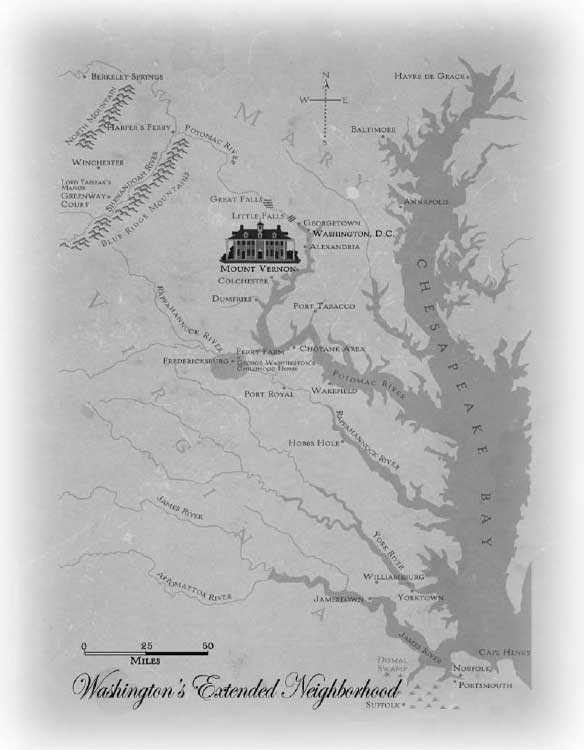
The early years of Washington’s life are known more through tradition,2 legend3 and myth,4 than reliable historical evidence. It is sometimes impossible to sort out which of these questionable historical sources best describes the various stories and anecdotes that have come down to posterity. Historians usually reject definitive statements from this part of his life, often adding a disparaging word about the “moralizing” of Parson Weems, Washington’s first popular biographer.
Some of the traditional stories of his early life focus on parental training for moral values. Did youthful Washington really reveal his honest character by telling his father, “I cannot tell a lie, I chopped down the cherry tree”? While virtually all historians today dismiss this as folklore, it is interesting to note that years before Parson Mason Weems immortalized the story in his hagiography of our founding father (written in the early eighteen hundreds) the story must have had some circulation. The evidence for this is a vase made in Germany around the time of the American Revolution (between the 1770s and the 1790s), honoring its leader, by depicting George as a young boy with a hatchet and cherry tree and bearing the initials “G.W.”5

Did George Washington again show his commitment to truth when he immediately told his mother that her favorite colt died while he was trying to break it in?6 In any event, it seems that George, even as a young man, was beginning to develop a reputation of honesty. We do know that Washington desired to be known as an honest man. In a letter to Reverend William Gordon on December 23, 1788, he wrote: “For the great Searcher of human hearts knows there is no wish in mine, beyond that of living and dying an honest man, on my own farm.”7
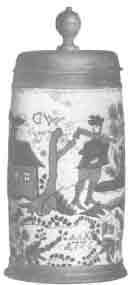
There is yet another story that his father, Augustine Washington, planted cabbage seeds so that when they grew, they would spell out GEORGE WASHINGTON, allowing George to discover this phenomenon on his own. Then, when the young boy told his father about it, George was instructed in the truths concerning the Designer and Creator of the universe.
Whether Washington ever saw his name growing by the design of his father through planted cabbage seeds, he did delight in the intelligent design8 he saw in the work of the “Creator” as he says in his acceptance letter to the American Philosophical Society:
In the philosophic retreat to which I am retiring, I shall often contemplate with pleasure the extensive utility of your Institution. The field of investigation is ample, the benefits which will result to Human Society from discoveries yet to be made, are indubitable, and the task of studying the works of the great Creator, inexpressibly delightful.9
While stories such as the cabbage seeds must remain in the region of uncertainty and apocryphal legend,10 there is a fair amount of important evidence to help us learn about George Washington’s childhood and teen years that imparted to him a deeply rooted concept of God.11 His training was also sufficient for the mastery of prerequisite knowledge and values required for a young man destined to assume a leadership role in the military, church, and government of his state of Virginia.
A BRIEF SUMMARY OF WASHINGTON’S CHILDHOOD
We do know he was born in 1732 (per the new dating or 1731 by the old dating)12 in Pope’s Creek, which was built by his father Augustine Washington in the mid-1720s. This was a part of Bridges Creek Plantation, the original seat of the Washington family in Virginia. It was located in Westmoreland County. Later the plantation would be called “Wakefield.” George Washington lived there for about three years until the house burned down in 1735. A handful of books survived the fire, some with signatures of Augustine and Mary Washington, and dates of 1727, for example.
In 1735, the Augustine Washington family with three-year-old George moved about sixty miles up the Potomac River to live near Little Hunting Creek, which would later be named Mount Vernon. The Pope Creek property they left behind was entrusted to George’s half brother Augustine, Jr., who was then about seventeen. Augustine, Jr.’s son, William Augustine, would take over the estate at about age seventeen, nearly thirty years later in 1774.
In 1738, six-year old George Washington and family moved again to Ferry Farm in King George County (later renamed Stafford County after the Declaration of Independence in 1776), located just across the Rappahannock River from Fredericksburg, Virginia. Washington lived in the Fredericksburg area for about fifteen years, until he was twenty-one in 1753, at which time he began his military career. Mary Washington, his mother, lived at Ferry Farm, while Lawrence, his older brother, lived in Mount Vernon until he died. George grew up under the care of his mother and older brother, enjoying periods of time at both of these large farms.
Childhood letters of the youthful George Washington were claimed to have been in existence in the Civil War years. Benson Lossing cites two of these alleged childhood letters that passed between Richard Henry Lee and young George Washington.13
George Washington received his education in Fredericksburg, which we will address in the next chapter. He also attended church at St. George’s Anglican Church, where he began his life-long habit of church-attendance.14
The young George Washington was remarkably strong and athletic. Written accounts claim he was capable of throwing a stone across the Rappahannock River, and all the way from the ground to the top of the natural bridge in Virginia.15 His diaries are filled with accounts of foxhunting, hunting, gunning, fishing, canoeing, and horseback riding.16 His power as a wrestler and thrower of the iron bar were legendary.17 He was accomplished and graceful in the more gentlemanly activities of dancing and horsemanship.18 As part of his training for a career in the military, he took fencing lessons from Jacob Van Braam, a Dutch officer in the British military service.19
WASHINGTON’S APPROVED DESCRIPTION OF HIS YOUTH
While it is clear that we don’t know much about Washington’s early life, we do know that the following description about his childhood by David Humphreys was not only read, but also corrected by Washington. As far as we know, Humphrey’s draft was the only biography approved by Washington. This work was almost lost to history, and was not printed until the late 1990s.20
By a domestic tutor (which was then generally & is now frequently the mode of education practiced in that part of the Continent) he was betimes instructed in the principles of grammar, the theory of reasoning, on speaking, the science of numbers, the elements of geometry, and the highest branches of mathematics, the art of mensuration, composing together with the rudiments of geography, history and the studies which are not improperly termed “the humanities.” In the graceful accomplishments of dancing, fencing, riding and performing the military exercises, he likewise made an early and conspicuous proficiency. In short, he was carefully initiated into whatever might be most useful to him, in making his way to preferment in the British army or navy, for which he was designed.
Though he was rather unsure & reserved in his appearance; he was frequently animated and fluent in conversation & always descreed [discreet] in conduct. & In the performance of any business committed to him, he was active, indefatigable, persevering. [He was noted for] His tall stature, for he was clear six feet high without his shoes; his gentiel deportment, for he had something uncommonly noble in his manners; his modest behaviour, which, without being the result of ill-becoming diffidence.
[He was] remarkably robust & athletic. I several times heard him say, he never met any man who could throw a stone to so great a distance as himself; and, that when standing in the valley beneath the natural bridge in Virginia, he has thrown one up to that stupendous arch.
[H]unting & Surveying – the first gave him activity & boldness – the second the means of improving the Coup d’oeil in judging of military positions & measuring by the eye the distance between different places. – Patience & perseverance in reconnoitering – how often he spent whole days on horseback, braving the ravages of the most violent heat & cold that ever was experienced in our climate.
As it was the design of his Father that he should be bred for an Officer in the British navy, his mental acquisitions & exterior accomplishments were calculated to give him distinction in that profession. <GW note: it was rather the wish of my eldest brother (on whom the several concerns of the family devolved) that this should take place & the matter was contemplated by him–My father died when I was only 10 years old.> At 15 years old, he was entered a midshipman on board of the [blank] & his baggage prepared for embarkation: but the plan was abandoned in consequence of the earnest solicitations of his Mother.21
We get a sense of the childhood home and grounds where George Washington grew up from an advertisement he placed in November 1772 to sell the property:
A TRACT of 600 acres, including about 200 of cleared land on the north side of Rappahannock river, opposite to the lower end of Fredericksburg. On this tract (a little above the road) is one of the most agreeable situations for a house that is to be found upon the whole river, having a clear and distinct view of almost every house in the said town, and every vessel that passes to and from it. Long credit, if desired, will be given.22
The man who bought the farm was Dr. Hugh Mercer of the city of Fredericksburg, who was a close friend of George’s. He would later become a general in the Revolutionary War and die at the Battle of Princeton in 1777. He bought the entire farm in 1774 for 2000 pounds Virginia currency, to be paid in five annual installments. In 1743, tragedy struck when George was only ten years old. His father Augustine suddenly died. (The account of his death was related in the prior chapter.) According to Mason Weems, George was not home when his father turned ill and did not return in time to see him before he died. However, another account says that George was there for his father’s final moments. Washington-biographer Edward C. M’Guire writes, “It was in the Easter holydays that Mr. Washington was taken sick. George was absent at the time, on a visit to some of his acquaintances in Chotanct, King George County. He was sent for after his father’s sickness became serious, and reached the paternal abode in time to witness the last struggle and receive the parting benediction of his beloved parent.”23
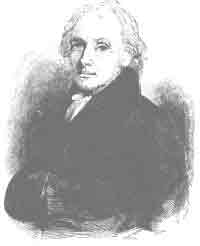
WASHINGTON’S BROTHER LAWRENCE INSPIRES HIS INTEREST IN THE MILITARY
Following the death of his father, George spent time with his older stepbrothers. Since Lawrence had married the daughter of Colonel William Fairfax of Belvoir, George not only found himself at Lawrence’s Mount Vernon, but also at Belvoir, the neighboring Fairfax estate. Here he encountered a British military family of high nobility. Col. William Fairfax was the cousin of and agent for Lord Thomas Fairfax, Sixth Baron of Cameron, and the owner of the entire Northern Neck. As George spent time at Belvoir, he assimilated many of the courtly graces that would characterize his adult life.
Lawrence was also militarily-minded, having served in the British navy during the war between the British and the Spanish, which had broken out in 1740, when Edward Vernon, commander-in-chief of the British Navy in the West Indies, captured the Spanish stronghold of Porto Bello on the Isthmus of Darien (between Columbia and Panama). Consequently, Spain allied with France in retaliation against England. The colonies in turn raised four regiments to assist England in the defense of the West Indies. Lawrence, with his father’s blessing, secured a commission as a captain in the regiment from Virginia and left in 1741 as second-in-command. Thus, Lawrence served under Admiral Vernon in the naval assault against Spanish Cartagena on the South American coast of Colombia.
The conflict ended disastrously, as the English were repulsed. Lawrence returned in 1742 with impaired health, having perhaps contracted tuberculosis during this time. But he also came home with a deep admiration for Admiral Vernon. Reverend Jonathan Boucher’s critical assessment of the Washington family referred to earlier reports that Lawrence, while at Cartagena, got into a “scrape with a brother officer,” and “did not acquit himself quite so well as he ought, and so sold out” (meaning he quit the military with a measure of embarrassment).24 Whether such was the case, it is clear that he honored the Admiral.
After his father Augustine died, Lawrence inherited the Hunting Creek farm, and changed its name to Mount Vernon. “Mount” was appropriate, given that the house was built on a majestic premonitory overlooking the Potomac River, situated on the nearly 2,500-acre tract of land. Augustine Washington’s Last Will and Testament also stipulated that if Lawrence should die without an heir, the estate was to pass to George.
Lawrence had planned to return to England, where he had attended school, and there join the regular army and seek advancement in the ranks. But before he was to leave, his martial plans were exchanged for marital plans, as he was engaged to Ann Fairfax, the daughter of Col. William Fairfax. William Fairfax, “of the King’s Council,” was “one of Virginia’s foremost men, land agent and cousin to Lord Fairfax, and owner of a fine estate called Belvoir.”25 Lawrence and Ann’s spring wedding plans were delayed until midsummer, because of the death of Augustine Washington, father to Lawrence and George. Lawrence was elected to the House of Burgesses, where he served for seven years. His better-known brother was to follow in this same path several years later.
In 1746, George spent a week at the Fairfax family’s Belvoir plantation mulling over a major life decision in regard to his military plans. In the context of this stay, the closeness between brothers Lawrence and George was recorded for history. In a September 1746 letter, Col. William Fairfax wrote to his son-in-law Lawrence Washington: “George has been with us, and says He will be steady and thankfully follow your Advice as his best friend.”26 Apparently the military discussions that occurred between Lawrence and Col. Fairfax, along with various visiting friends from former military days, helped to instill in George a desire and a decision for military service. Thus, around this time, Lawrence began to make plans for George to pursue a naval career in the legacy of Admiral Vernon.
A DECISION THAT WOULD HAVE CHANGED WORLD HISTORY
In 1746, George Washington reached a significant, potential turning point in his life. He almost joined the British Navy. Had he followed through on this, world history could have changed.
As we have noted, his talks with Lawrence and Lawrence’s father-in-law awakened an interest in the fourteen-year-old George Washington to pursue military service. Given the many ships that docked and passed on the river from across the sea, it was natural to think of naval service as a possibility for the young man. Lawrence, along with the help of Dr. Spencer, Mary Washington’s family physician, persuaded George’s reluctant mother that his military interest would be well met in the Navy. So, late in 1746, Lawrence secured for fourteen-year-old George a midshipman’s warrant.
But his mother had apprehension. His mother’s reticence to embrace George Washington’s longing for the high seas is seen in a letter written by Robert Jackson, one of Lawrence’s friends from Fredericksburg. Apparently, she had initially approved (“her first resolution”), but upon greater input, changed her mind:
I am afraid Mrs. Washington will not keep up to her first resolution. She seems to dislike George’s going to sea, and says several persons have told her it was a bad scheme. She offers several trifling objections, such as a fond, unthinking mother habitually suggests, and I find that one word against his going has more weight than ten for it.27
The plans finally received a decisive maternal veto, after she received a letter from London from her brother, Joseph Ball, dated May 19, 1747. His arguments proved to be decisive against a naval career for George,
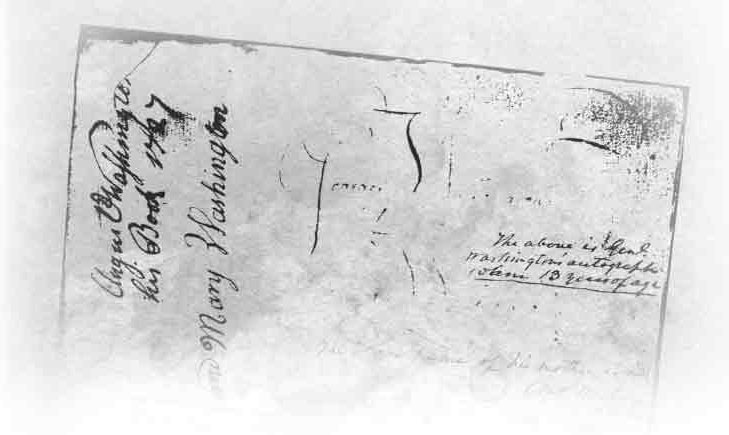
I understand that you are advised and have some thoughts of putting your son George to sea. I think he had better be put apprentice to a tinker, for a common sailor before the mast has by no means the common liberty of the subject; for they will press him from ship to ship, where he has fifty shillings a month, and make him take twenty-three, and cut and slash and use him like a negro, or rather like a dog. And as to any considerable preferment in the navy, it is not to be expected, as there are always so many gaping for it here who have interest, and he has none.
And if he should get to be a master of a Virginia ship (which it is very difficult to do), a planter who has three or four hundred acres of land and three or four slaves, if he be industrious, may live more comfortably, and leave his family in better stead than such a master of a ship can . . . . He must not be too hasty to be rich, but go on gently and with patience, as things will naturally go. This method, without aiming at being a fine gentleman before his time, will carry a man more comfortably and surely through the world than going to sea, unless it be a great chance indeed. I pray God keep you and yours.
Your loving brother, Joseph Ball28
The timing could not have been tighter, since the letter arrived when George’s luggage had already been loaded on the ship on which he would have sailed. The historical impact of this decision is profound.
Benson J. Lossing’s explanation reflects the significance of this decision from the perspective of an earlier generation of American Washington scholars,
He was destined by Heaven for a far noble career than man had conceived for him. This incident illustrates the truth of the familiar apothegm, “Man proposes but God disposes.”29
We do not know if the young ex-midshipman George Washington embraced the doctrine of Providence the way that the mature General Washington did as he commanded the army on the land many years later.30 Here is one sample among several hundred reflecting his belief in Providence. Writing to William Pearce from Philadelphia, near the end of his presidency on May 25, 1794, Washington explains his confidence in Divine Providence:
I learn with concern from your letter of the 18th. Instant, that your crops were still labouring under a drought, and most of them very much injured. At disappointments and losses which are the effects of Providential acts, I never repine; because I am sure the alwise disposer of events knows better than we do, what is best for us, or what we deserve.31
We do not know what George thought about this change in plans, but he obviously submitted to his mother’s authority. Respect for higher authority was a principle that Washington maintained throughout his life. Years later, even though entrusted by Congress with the powers of a dictator for a season,32 and even though given the opportunity to become a new king at the end of the war by his soldiers, Washington never wavered in his immovable commitment to submit to lawful powers over him. This aspect of his character was remarkably highlighted by Alexander Hamilton years later in the midst of the efforts to make Washington King, as seen in a later chapter.33
“The maternal hand that bent the twig” never lost the place of honor in the heart of her son. Even to the final years of Mary Washington’s life, General Washington called her in his letters “My Revered Mother” or “Honored Madam,” but this was also his title for her in his public statements as well. Thus, he wrote to the people in his hometown of Fredericksburg in 1784: “To a beneficent Providence, and to the fortitude of a brave and virtuous Army, supported by the general exertion of our common Country I stand indebted for the plaudits you now bestow; ... my sensibility of them is heightened by their coming from the respectable Inhabitants of the place of my growing Infancy and the honorable mention which is made of my revered Mother; by whose Maternal hand (early deprived of a Father) I was led from Childhood.”34 His consciousness of her impact on his character was implied in his advice given in 1796 to his own young “son,” George Washington Parke Custis, “...for you know it has been said, and truly, ‘that as the twig is bent so it will grow.’ This, ... shows the propriety of letting your inexperience be directed by maturer advice.”35 As Mary had guided young George, so the new young George needed to be guided by a mature adult as well.
Washington had come to trust the wisdom of divine intervention in the events of his life. He also understood the power of a reluctant mother’s intervention in a son’s decision for military service. In a letter to Landon Carter on April 15, 1777, General Washington remarked, “I should have been very happy in seeing your Grandson enlisted under the Banners of His country...But a mother’s tenderness and Tears too often interpose, and check the ardour of our Youth.”36
YOUNG GEORGE COMES OF AGE AT MT. VERNON
During the years 1746-48 when George was between fourteen and sixteen years of age, he lived primarily with his brother Lawrence at Mount Vernon. In 1747, at the age of fifteen, George assumed an adult responsibility when he became a godfather to a child in baptism.37 Throughout his life he became a godfather for some eight children in all. That role required subscribing to the orthodox and Trinitarian doctrines of the Church of England. In conformity with the 1662 Book of Common Prayer, the following affirmations were required of the fifteen-year-old Washington, as they were of all godfathers and godmothers:
Then shall the Priest speak unto the Godfathers and Godmothers on this wise.
DEARLY beloved, ye have brought this Child here to be baptized, ye have prayed that our Lord Jesus Christ would vouchsafe to receive him, to release him of his sins, to sanctify him with the Holy Ghost, to give him the kingdom of heaven, and everlasting life. Ye have heard also that our Lord Jesus Christ hath promised in his Gospel to grant all these things that ye have prayed for: which promise he, for his part, will most surely keep and perform. Wherefore, after this promise made by Christ, this Infant must also faithfully, for his part, promise by you that are his sureties, (until he come of age to take it upon himself,) that he will renounce the devil and all his works, and constantly believe God’s holy Word, and obediently keep his commandments.
I demand therefore,
DOST thou, in the name of this Child, renounce the devil and all his works, the vain pomp and glory of the world, with all covetous desires of the same, and the carnal desires of the flesh, so that thou wilt not follow, nor be led by them? [Washington then answered]. I renounce them all.
Minister.
DOST thou believe in God the Father Almighty, Maker of heaven and earth? And in Jesus Christ his only-begotten Son our Lord? And that he was conceived by the Holy Ghost; born of the Virgin Mary; that he suffered under Pontius Pilate, was crucified, dead, and buried; that he went down into hell, and also did rise again the third day; that he ascended into heaven, and sitteth at the right hand of God the Father Almighty; and from thence shall come again at the end of the world, to judge the quick and the dead? And dost thou believe in the Holy Ghost; the holy Catholick Church; the Communion of Saints; the Remission of sins; the Resurrection of the flesh; and everlasting life after death?
[Washington then answered] All this I stedfastly believe.
Minister.
WILT thou be baptized in this faith?
[Washington then answered] That is my desire.
Minister.
WILT thou then obediently keep God’s holy will and commandments, and walk in the same all the days of thy life?
[Washington then answered] I will.
Then shall the Priest say,
O MERCIFUL God, grant that the old Adam in this Child may be so buried, that the new man may be raised up in him.
[Washington then responded] Amen.
Grant that all carnal affections may die in him, and that all things belonging to the Spirit may live and grow in him. [Washington then responded] Amen.
Grant that he may have power and strength to have victory, and to triumph, against the devil, the world, and the flesh. [Washington then responded] Amen.
Grant that whosoever is here dedicated to thee by our office and ministry may also be endued with heavenly virtues, and everlastingly rewarded, through thy mercy, O blessed Lord God, who dost live, and govern all things, world without end.
[Washington then responded] Amen.
ALMIGHTY, everliving God, whose most dearly beloved Son Jesus Christ, for the forgiveness of our sins, did shed out of his most precious side both water and blood; and gave commandment to his disciples, that they should go teach all nations, and baptize them In the Name of the Father, and of the Son, and of the Holy Ghost: Regard, we beseech thee, the supplications of thy congregation; sanctify this Water to the mystical washing away of sin; and grant that this Child, now to be baptized therein, may receive the fulness of thy grace, and ever remain in the number of thy faithful and elect children; through Jesus Christ our Lord. [Washington then responded] Amen.
So, on some eight different occasions, George Washington publicly and explicitly affirmed his Christian faith in these words, a remarkable fact given Washington’s powerful conscience. Significantly, Thomas Jefferson, a Unitarian rather than an orthodox Christian, turned down the invitation to be a godfather in 1788, because he could not in good conscience subscribe to the Trinitarian beliefs of the church.38
CONCLUSION
In 1748, George took another step as a sixteen-year-old young adult when he joined a surveying trip to Shenandoah Valley with James Genn on behalf of Lord Fairfax. Perhaps we can say that George officially came of age in 1749, when he was appointed a public surveyor. Even here the Christian influences in his life are evident. The very first page of his surveyor notebook has a single sentence inscribed by the youthful Washington’s hand. It says, “If you can’t find it in the book of Ezekiel, look for it in Israel.”
The cryptic message makes sense in light of Washington’s Christian training. As Washington was taught the scriptures by his Anglican childhood tutors, he learned that Israel was a nation marked out by very clear boundaries (Joshua 13-21), such as would be well understood by surveyors. And the book of Ezekiel concludes with a remarkable survey of the New Jerusalem (Ezekiel 40-48). The young surveyor apparently autographed his official record with this observation. His task in the pristine woods of the New World in some way reminded him of the biblical accounts of marking off expanses of land that had been gifted by God.
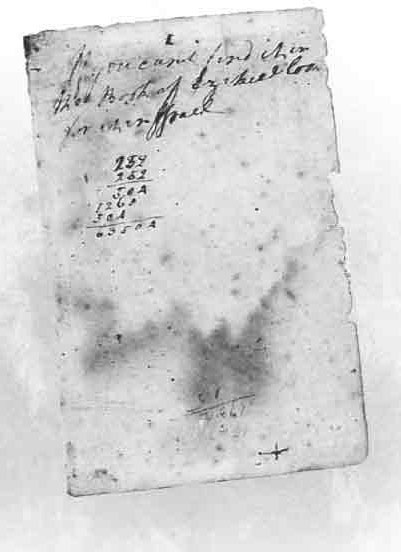
Not much is known about George Washington’s childhood and early manhood. His father, who was a successful businessman and leader in the church, died young. His mother was a woman of faith. From everything we can tell, he was an obedient son. We do know a little more about his education and, as we shall see next, it was Christian.